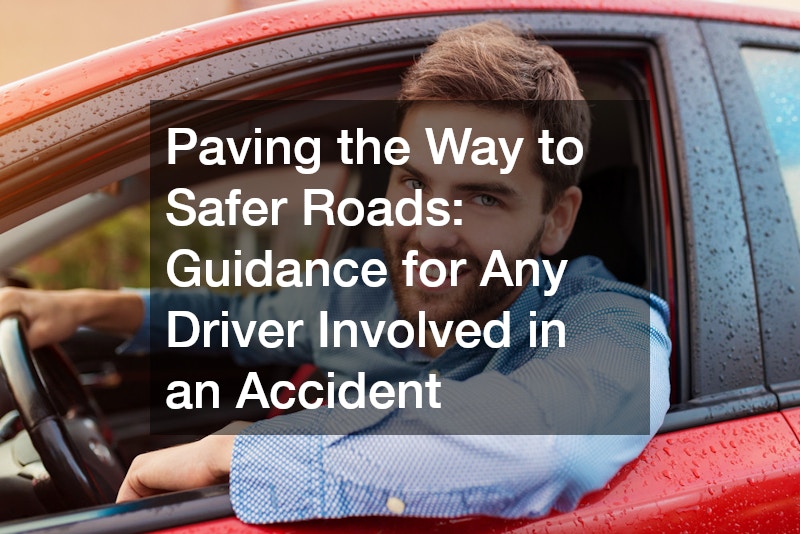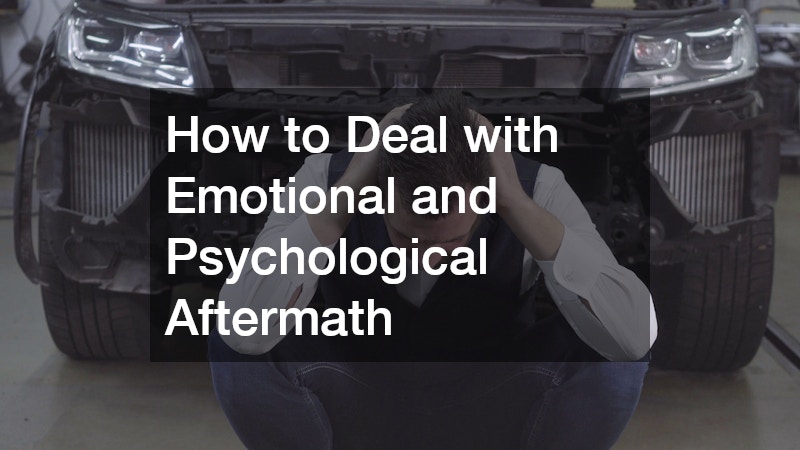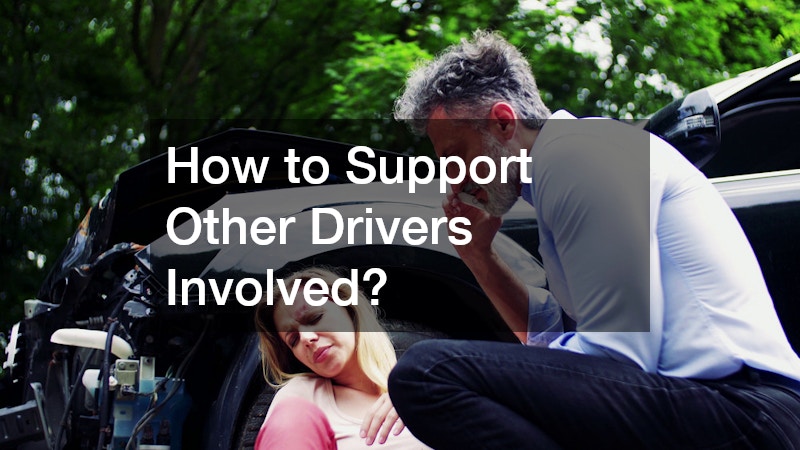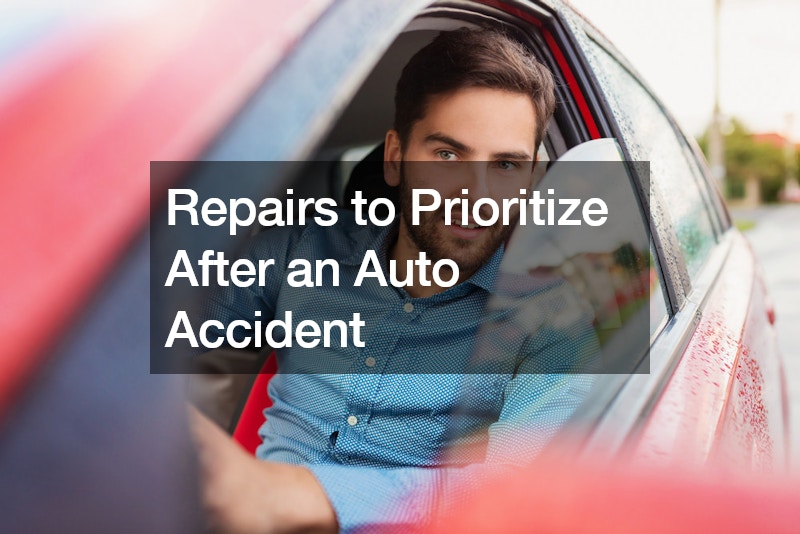Paving the Way to Safer Roads: Guidance for Any Driver Involved in an Accident
Road accidents can happen to anyone, whether you’re commuting in a compact car, hauling a trailer with a semi truck, or navigating freshly laid blacktop paving. Understanding the necessary steps to take immediately following a collision can drastically influence outcomes in terms of safety, insurance claims, and legal liability. This guide provides practical, detailed advice for any driver involved in an accident, covering everything from initial safety precautions to legal guidance, vehicle repair, and emotional recovery. By approaching these situations methodically, drivers can protect themselves, others, and the integrity of the roads we all share. Recognizing the seriousness of an accident early on also helps prevent mistakes that could complicate claims or increase personal risk. Taking the right actions at the moment of impact can be just as important as the repairs and legal processes that follow.

What Should You Do Immediately After an Accident?
Safety Precautions and Securing the Scene
First and foremost, ensure the safety of yourself and others. Move vehicles to the shoulder if possible, turn on hazard lights, and establish warning triangles to alert approaching traffic. Especially when accidents occur on freshly paved asphalt paving or blacktop, securing the scene can prevent secondary collisions. Make sure all passengers are safely away from traffic and never stand between vehicles. Using reflective vests or flares can further improve visibility for oncoming drivers.
Communicating with Emergency Services
Contact local emergency services immediately. Provide clear details about your location, the number of vehicles involved—including trailers or semi trucks—and any apparent injuries. Prompt communication ensures rapid response and can save lives. Stay on the line with dispatchers and follow their instructions carefully, as they can guide you on immediate safety measures. Accurate reporting at this stage can also help establish a reliable record for insurance purposes.
Checking for Injuries and Providing First Aid
Before moving anyone seriously injured, check the condition of all passengers. Administer first aid within your skill level while waiting for emergency responders. Driver education courses often emphasize first response protocols, which can be lifesaving in critical moments. Avoid moving individuals unless there is imminent danger, such as fire or leaking fuel. Keep calm and reassure victims to prevent panic and additional stress.
How to Document the Accident Effectively
Taking Photographs of the Scene
Photographs are crucial for insurance claims and legal proceedings. Capture vehicle positions, skid marks, damage to trailers or semi trucks, and roadway conditions, including asphalt paving or blacktop issues that may have contributed. Include multiple angles of each vehicle and any surrounding signage or barriers. High-quality images make it easier for adjusters or lawyers to assess damages accurately.
Gathering Witness Statements
If witnesses are present, request their contact information and a brief account of what they observed. Independent testimonies strengthen claims and clarify accident circumstances. Document each statement immediately to ensure accuracy. A detailed account from a third party can be invaluable if disputes arise later.
Recording Details and Information
Keep meticulous notes, including the time, weather conditions, and any road signage or construction zones. Include details about towing service arrangements or any tow truck service assistance required. These records will be valuable when coordinating with insurers or a car accident lawyer. Record license plate numbers, insurance information, and vehicle makes and models for all parties. Adding your personal observations about how the accident unfolded provides context that photographs alone cannot convey.
What Are Your Legal Obligations?
Understanding Legal Reporting Requirements
Most states require drivers involved in accidents to file police reports if there’s injury, death, or substantial property damage. Semi trucks and trailers have additional regulatory requirements under commercial transportation laws. Failure to comply can result in fines, license suspensions, or legal liabilities. Being informed of your responsibilities ensures you meet deadlines and reduce legal complications.
Knowing When to Contact a Lawyer
Engaging a truck accident attorney or car accident lawyer promptly can safeguard your rights, especially if liability is disputed or injuries are significant. Legal counsel can advise on how to interact with insurers and other parties involved. A lawyer can also help negotiate settlements and prevent signing documents that could inadvertently limit compensation. Early guidance can make a substantial difference in protecting your financial interests.
Following Up with Authorities
Ensure that you follow up on any police reports or citations issued. Accurate reporting helps establish a clear record of the accident for insurance purposes and any future litigation. Keep copies of all documentation received from authorities. Maintaining a detailed log of interactions strengthens your position if disputes or delays arise.
How to Communicate with Other Parties Involved
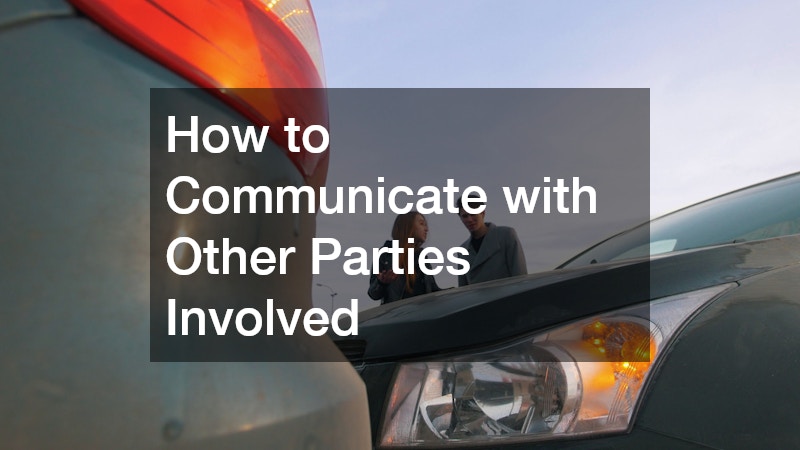
Exchanging Information Calmly
Exchange contact, insurance, and vehicle information with other drivers. Avoid heated discussions, even if the other party operates a semi truck or owns multiple trailers. Keep your tone neutral and professional, and avoid speculation about fault. Calm exchanges help reduce tensions and make the reporting process smoother for all involved.
Avoiding Admitting Fault
Do not admit liability at the scene. Statements implying fault can impact claims and legal proceedings. A car accident lawyer can provide guidance on phrasing and communications. Focus on providing factual details about the accident without interpretation. Let authorities and insurance companies determine liability based on evidence.
Dealing with Confrontational Situations
Remain calm if tensions rise. Avoid arguments and focus on documenting the incident. Sometimes, towing service personnel or law enforcement intervention is necessary to de-escalate conflicts safely. Do not engage in physical or verbal confrontations, as this can escalate legal complications. Maintaining composure protects your credibility and ensures your safety.
How Does the Insurance Process Work?
Initiating the Claim with Your Insurer
Notify your insurance company promptly. Include detailed documentation of vehicle damage, photos of the scene, and information about any tow truck service used to remove vehicles from the roadway. Accurate reporting expedites the claims process and reduces the likelihood of disputes. Keep a record of all communications with your insurer, including dates, times, and representatives’ names.
Understanding Coverage and Limits
Insurance policies vary for personal vehicles versus commercial vehicles, including semi trucks or trailers. Knowing the coverage limits ensures proper financial recovery and prevents unexpected out-of-pocket costs. Review your policy details carefully to understand what is and isn’t covered. Clarifying limits before repairs begin helps avoid misunderstandings with auto repair shops.
Navigating Delays and Disputes
Disagreements over fault or repair costs can delay settlements. Having records, witness statements, and legal support from a car accident lawyer can help resolve disputes efficiently. Stay patient and cooperative with insurers while maintaining your documentation. Persistence and organization can make a significant difference in the outcome.
What Are Common Mistakes Made by Drivers?
Failing to Report the Accident Timely
Delayed reporting can complicate claims and create legal exposure. Immediate notification to insurers and authorities is essential for accurate documentation. Even minor accidents should be reported to prevent later disputes. Prompt reporting is a key component of responsible driver behavior.
Neglecting Medical Check-Ups Post-Accident
Even minor injuries can escalate if untreated. Medical records support insurance claims and protect your legal position. Consult a healthcare professional even if you feel fine immediately after the accident. Some injuries, such as whiplash, may not show symptoms until days later.
Not Keeping a Detailed Record of Events
Overlooking details like road conditions, vehicle positions, or towing service interactions can hinder claim processing. Driver education emphasizes the importance of thorough record-keeping. Consistent notes and photos taken soon after the accident provide an accurate account. These records serve as evidence if questions arise during insurance or legal proceedings.
How to Deal with Emotional and Psychological Aftermath
Recognizing Signs of PTSD or Anxiety
Accidents can trigger stress, anxiety, or post-traumatic stress disorder. Awareness allows early intervention and healthier coping. Physical stress responses like fatigue, tension, or sleep disturbances may also indicate trauma. Recognizing these signs early helps prevent long-term mental health issues.
Seeking Professional Help
Counseling and therapy can provide strategies to manage fear, stress, and trauma related to driving or being in an accident. Professional guidance helps drivers regain confidence behind the wheel and reduces accident-related anxiety. Early intervention often speeds emotional recovery and improves overall well-being.
Engaging in Support Groups
Peer groups for accident survivors or drivers involved with semi trucks or trailers offer shared experiences, practical advice, and emotional reassurance. Hearing others’ experiences normalizes feelings and provides constructive coping strategies. Support networks can also recommend trusted auto repair shops, towing services, or legal professionals.
What Are the Steps for Car Repair and Maintenance?
Getting a Professional Assessment
Have certified auto repair shops inspect your vehicle. Services may include both mechanical repairs and auto body shop work, particularly if your car sustained dents or frame damage. A thorough inspection ensures all hidden issues are addressed before driving again. Even small cosmetic damage can affect resale value if not repaired promptly.
Understanding Repair Shop Estimates
Request detailed quotes, including parts and labor for auto repairs or any necessary blacktop paving repair to the property if applicable. Compare multiple estimates to ensure competitive pricing. Clarify timelines and warranties included with the repair work. A transparent estimate helps prevent unexpected costs and ensures repairs meet your expectations.
Ensuring Quality of Repair Work
Check that repairs meet industry standards, with proper warranties. Even minor cosmetic work, like paint touch-ups or auto wraps, should be performed with precision to maintain vehicle value. Inspect completed repairs thoroughly before signing off on work. High-quality work reduces the likelihood of repeat visits and improves overall vehicle safety.
How Can You Prevent Future Accidents?
Enhancing Defensive Driving Skills
Driver education emphasizes anticipating hazards, maintaining safe following distances, and adjusting for road conditions, including freshly laid asphalt paving. Regularly practicing defensive techniques reduces reaction time and prevents common accident scenarios. Training with a qualified instructor can reinforce skills for handling semi trucks or trailers safely.
Regular Maintenance of Your Vehicle
Routine checks of brakes, tires, and lights reduce the likelihood of mechanical failures that can lead to accidents. Towing services may be needed if preventative measures are neglected. Keep a service log and schedule inspections at recommended intervals. Well-maintained vehicles are less likely to experience breakdowns that cause accidents.
Staying Informed About Traffic Laws
Traffic regulations evolve. Understanding current rules for passenger cars, semi trucks, or
trailers ensures compliance and reduces accident risk. Regularly reviewing updates from local transportation authorities or participating in refresher driver education courses can keep you informed. Staying knowledgeable about changing speed limits, signage, and roadwork zones also protects you and other drivers on the road.
How to Support Other Drivers Involved?
Offering Help as a Witness
Provide accurate statements if asked. Your testimony may aid other drivers in securing insurance settlements or legal resolutions. Offering assistance in a calm and factual manner can also help law enforcement and emergency responders. Being a reliable witness contributes to a fair and thorough accident report.
Providing Contact Information for Support
Share your contact details for follow-up questions, especially if you assisted in coordinating towing service or provided eyewitness accounts. Make sure your information is accurate and up to date to avoid miscommunication. Following up politely when needed can clarify details that may impact claims or legal processes.
Being Patient and Empathetic
Accidents are stressful for all parties. Demonstrating patience, offering reassurance, and facilitating communication contribute to a safer, more cooperative environment. Empathy can help de-escalate tensions and foster collaboration between drivers, authorities, and insurance representatives. A considerate approach encourages mutual respect and a more efficient resolution.
Conclusion
Accidents are stressful, but informed action can make a significant difference for any driver involved in an accident. By following safety protocols, documenting events, communicating effectively, and seeking professional advice—including guidance from a car accident lawyer or truck accident attorney—drivers can protect themselves legally, financially, and emotionally. Preparation and understanding of the process reduce anxiety and help manage both immediate and long-term consequences. Being proactive demonstrates responsibility and can positively influence claim outcomes.
Repairing vehicles through auto repair shops or auto body shop specialists restores functionality and appearance, while proper driver education, routine maintenance, and defensive driving reduce future accident risk. Even challenging incidents involving semi trucks, trailers, or complex roadway conditions like blacktop paving can be managed successfully with knowledge, preparation, and the right professional support. Choosing reputable auto repair facilities and certified professionals ensures high-quality repairs and prevents recurring mechanical issues. Maintaining awareness of proper towing service procedures and safe vehicle handling further enhances road safety.
Ultimately, preparedness and responsible behavior not only facilitate a smoother accident resolution but also contribute to safer roads, protecting all drivers and fostering a culture of accountability and care on our highways. By combining preventive measures, proper documentation, legal guidance, and emotional support, any driver involved in an accident can navigate the aftermath effectively. Safer roads are built on the collective diligence of drivers, repair experts, and informed communities working together.
